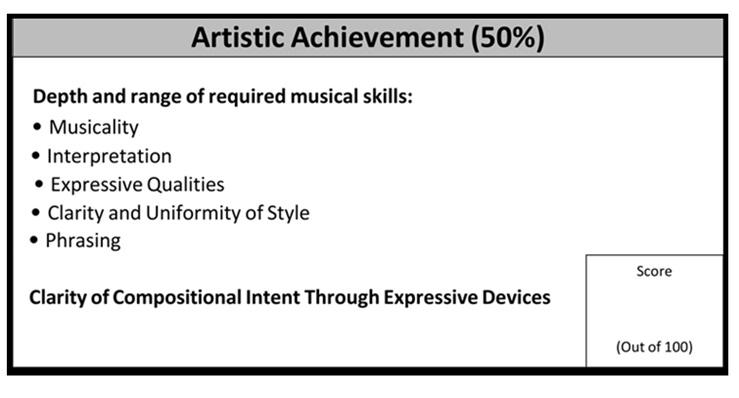
With the North American Brass Band Championships taking place in Huntsville, Alabama this weekend, 4BR has spoken with Tony Granados, a Past President of the North American Brass Band Association (NABBA) to find out more about the adjudication system that will be employed at the event.
New approaches
“Reading recent articles on 4Barsrest by Iwan Fox and Chris Thomas has been really interesting for us here in the USA," he says.
"There are of course many subtleties to any adjudication process, and whilst the UK has maintained a strong link to its traditions, in the USA we have tried new approaches.
One of my objectives during my tenure as President of NABBA was to look into the process of adjudication for our championships, and work towards a more valid, reliable and accountable tool for adjudicators.”
American foundation
With that in mind, Tony explained the foundation of the approach that will be used at this weekend’s NABBA Championships - one that is linked to musical evaluation in the US education system.
“Decades of study, research and development has been undertaken to improve best practices, criteria and technology when assessing musical groups in a competitive arena.
Decades of study, research and development has been undertaken to improve best practices, criteria and technology when assessing musical groups in a competitive arena.
Those involved in this arena have extensively reviewed the academic assessment literature and applied this knowledge to the development and implementation of an adjudication system that is valid and reliable. NABBA has taken their work and adapted it to our unique art of brass banding.”

Tony Granados is a past Presient of NABBA and on its Board in the Adjudication, Music and Contest committees.
Analysis
He adds: “Statistical analysis of contest results from our pre-pandemic NABBA Championships compared to results post pandemic (after we implemented our current system) found a 40% decrease in the affect one adjudicator's score may have on the results, and a statistically significant increase in inter-adjudicator reliability.”
This adaptation was developed in consultation with the late Dr. Joseph Allison, who was a leading researcher in arts evaluation, with Tony stating that the empirical outcomes can be attributed to the implementation of a philosophy that “consistently guides the judges”.

Key element
He continues: “An essential element of the NABBA system included adopting the concepts of the value of a point, the concept of ‘neighbourhoods’, ranking and rating, and the process of impression, analysis and comparison.
These are all tools with which music educators are familiar with, and trained judges work many hours understanding and developing the skill to use.”
Tony explains that it is felt at the key to using these tools, is as he says, “putting them in the hands of musicians that have great understanding about the technical and artistic aspects of music making.”
Tony explains that it is felt at the key to using these tools, is as he says, “putting them in the hands of musicians that have great understanding about the technical and artistic aspects of music making.”
What and How
The guidance given to the judges says the ‘What’ of the performance is comprised of the composition’s technical and musical challenges provided to the band, as demonstrated through the performance.
The ‘How’ of the band’s performance focuses on the excellence in overall sound quality and accuracy; appropriateness and quality of balance, blend, sonority, and fidelity; ensemble cohesiveness, expression and uniformity of style and interpretation, and mastery of musical challenges.
Consideration is given to all musical and technical components of the performance and the level to which the ensemble demonstrates those components through performance quality, consistency, and understanding of the musical opportunities presented in the content.
50% of the marks are given to Technical Achievement, with 50% given to Artistic Achievement.
Technical Achievement comprises clarity of compositional intent through technique in the following elements:

Artistic Achievement comprises clarity of compositional intent through expressive device in the following elements:

Further scope
5 different levels of score (out of 100) in each section of technical and artistic achievement are then scored in relation whether the adjudicator believes they are met as follows:
Box 1: 40 - 49 (if rarely met)
Box 2: 50 - 59 (sometimes met)
Box 3: 60 - 74 (usually met)
Box 4: 75 - 89 (consistently met)
Box 5: 90 - 100 (almost always met)

A ‘final total spread’ allows the adjudicator to offer further comparison between performances (with use of half points if appropriate) – from comparable to significant differences (from 1-3 points to 10 points or higher).
Bias and ethics
In addition, Tony states that NABBA has also addressed issues of personal bias and ethics.
“We made the decision that comments such as ‘I don’t like that composer’, or ‘I would not have done it that way’, would have no place in the commentary or assessment of a NABBA band’s performance.
Addressing adjudicator ethics in such a small community as brass banding has significant challenges relative to maintaining anonymity in a blind judging process.”
Feel confident
He adds: “As stated in previous articles on this topic, the optic of impartiality is as important as is placing trust in the adjudicator.
Bands and audiences need to feel confident that the outcome of a competition is fair and impartial. The true testament to the integrity of the potential judges in this medium is reflected in their professionalism and desire to do the right thing by being fair and impartial.
The true testament to the integrity of the potential judges in this medium is reflected in their professionalism and desire to do the right thing by being fair and impartial.
We believe we have done that, enabling the adjudicator to evaluate what an ensemble has chosen to perform, the technical and artistic challenges present in the chosen repertoire, and how they are performing their chosen repertoire reflected by the quality of realization of the written score.
The judge assigns numbers that have meaning based on universally understood standard criteria. This is the foundation of the NABBA system and will gain reliability over time as adjudicators practice and use the system.”

The NABBA Championships take place at the Von Braun Centre in Alabama
More debate
He concludes: “There are so many complexities to adjudication, and no doubt as many opinions.
However, we should not lose sight of why we enjoy brass banding in the first place, and have faith that progress can be made. Improving this essential part of our movement is important, and someone has to try.
Over time, I’m positive there will be some intriguing debates surrounding this topic – and the subtleties that I spoke of at the beginning of this interview.
However, we should not lose sight of why we enjoy brass banding in the first place, and have faith that progress can be made. Improving this essential part of our movement is important, and someone has to try.
For the moment I hope this sheds a little light on our approach and why we have undertaken it.”
A future series of talks about adjudication will be planned for Tony’s popular podcast entitled ‘New Word BrassCast’ at: https://www.newworldbrass.com/#/ which is co-hosted by Amy Bliss and Aaron Campbell.
Iwan Fox
Tony Granados is the Past President of the North American Brass Band Association and is currently on the NABBA Board in the Adjudication, Music and Contest committees.











